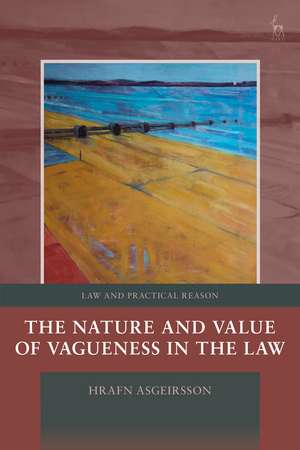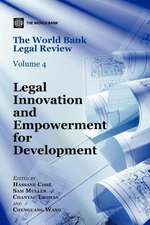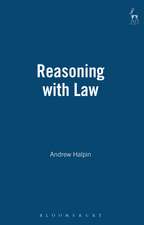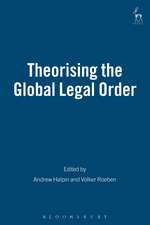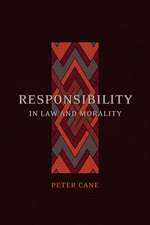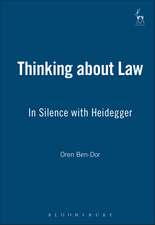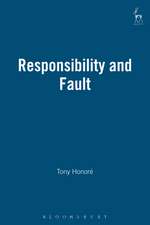The Nature and Value of Vagueness in the Law: Law and Practical Reason
Autor Hrafn Asgeirssonen Limba Engleză Hardback – 15 apr 2020
Din seria Law and Practical Reason
- 30%
 Preț: 600.22 lei
Preț: 600.22 lei - 27%
 Preț: 376.93 lei
Preț: 376.93 lei - 21%
 Preț: 229.36 lei
Preț: 229.36 lei - 34%
 Preț: 509.38 lei
Preț: 509.38 lei - 34%
 Preț: 509.52 lei
Preț: 509.52 lei - 18%
 Preț: 358.50 lei
Preț: 358.50 lei - 22%
 Preț: 271.14 lei
Preț: 271.14 lei - 30%
 Preț: 571.66 lei
Preț: 571.66 lei - 30%
 Preț: 569.37 lei
Preț: 569.37 lei - 30%
 Preț: 597.63 lei
Preț: 597.63 lei - 22%
 Preț: 270.20 lei
Preț: 270.20 lei - 21%
 Preț: 216.62 lei
Preț: 216.62 lei - 30%
 Preț: 569.60 lei
Preț: 569.60 lei - 23%
 Preț: 191.48 lei
Preț: 191.48 lei - 18%
 Preț: 307.13 lei
Preț: 307.13 lei - 22%
 Preț: 251.83 lei
Preț: 251.83 lei - 21%
 Preț: 217.27 lei
Preț: 217.27 lei - 18%
 Preț: 308.07 lei
Preț: 308.07 lei - 30%
 Preț: 603.81 lei
Preț: 603.81 lei
Preț: 509.93 lei
Preț vechi: 730.92 lei
-30% Nou
Puncte Express: 765
Preț estimativ în valută:
97.57€ • 102.15$ • 80.74£
97.57€ • 102.15$ • 80.74£
Carte tipărită la comandă
Livrare economică 05-19 aprilie
Preluare comenzi: 021 569.72.76
Specificații
ISBN-13: 9781849466066
ISBN-10: 1849466068
Pagini: 216
Dimensiuni: 156 x 234 x 13 mm
Greutate: 0.48 kg
Editura: Bloomsbury Publishing
Colecția Hart Publishing
Seria Law and Practical Reason
Locul publicării:London, United Kingdom
ISBN-10: 1849466068
Pagini: 216
Dimensiuni: 156 x 234 x 13 mm
Greutate: 0.48 kg
Editura: Bloomsbury Publishing
Colecția Hart Publishing
Seria Law and Practical Reason
Locul publicării:London, United Kingdom
Caracteristici
The book aims to give plausible answers to three related questions: In virtue of what is the law vague? What might be good about vague law? How should courts resolve cases of vagueness?
Notă biografică
Hrafn Asgeirsson is Senior Lecturer in Philosophy and Law at the University of Surrey, School of Law.
Cuprins
1. Authority, Communication and Legal Content I. The Communicative-Content Theory of Law and Its (Recent) Critics II. The Pro Tanto View about Legal Content III. Authority, Communication and Legal Content 2. On the Instrumental Value of Vagueness in the Law I. Incommensurate Multidimensionality, Extravagant Vagueness and Endicott's Argument from Instrumental Necessity II. Incommensurate Multidimensionality is Doing the Real Work III. The Impossibility of Specification IV. Are Incommensurate Multidimensionality and - Hence - Vagueness Really Necessary? V. Waldron's Argument from Facilitation VI. Possible Reply: Vagueness Really is a Means to the Relevant Ends VII. Another Possible Reply: The Logic of Value Validates Closure under Necessary Consequence 3. Vagueness and Power Delegation in Law I. Sorensen's View II. The Value of Vagueness III. Summary 4. Vagueness, Uncertainty and Behaviour I. Endicott's Argument from Comparative Value II. Hadfield on the Value of Vagueness-related Uncertainty III. Sorensen on Vagueness-related Uncertainty and Legal Unpredictability 5. On the Possibility of Non-literal Legislative Speech I. The Conditions for Non-literal Speech and the Legislative Context II. Revising the Argument: Restrict, Reconstruct, or Both? III. Testing the Argument against Experience: Ekins's Argument from Examples IV. Indeterminacy about Utterance Content 6. Textualism, Content and Interpretation I. Textualism and Legislative Intentions II. Textualism, Communicative Content and Legal Content III. Textualism/Originalism and Contextual Enrichment IV. On the Plausibility of Conception Textualism V. Contemporary Textualism and the Problem of Legislative Context VI. Textualism and Legal Interpretation 7. Resolving Cases of Vagueness I. Expressly Offered Rationale and the Notion of Commitment II. Institutional Remedies to Non-co-operation III. Is Expression Required? IV. Commitment and Counterfactuals V. Legislative Rationale and Levels of AbstractionVI. Authority, Legislative Bargaining and Maximising Fidelity to Law VII. Expressly Acknowledged Compromise vs Tacitly Acknowledged Compromise VIII. Conclusion 8. Legal Practice and Theories of Vagueness I. Explaining the Value of Vagueness in the Law II. A Closer Look at Soames's Argument III. Generalising the Argument: Other Cautionary Tales
Recenzii
[Vagueness in law has been] a focal point of jurisprudence for six decades, and Asgeirsson's The Nature and Value of Vagueness in Law is an important contribution to this field . the book really does make a lot of progress, on an awful lot of issues. Plus, it's refreshingly precise. Nary an argument goes by without the premises being explicitly identified.
There is much of interest here for philosophers of language and law on the nuance of linguistic sources of vagueness and how to resolve them.
There is much of interest here for philosophers of language and law on the nuance of linguistic sources of vagueness and how to resolve them.
